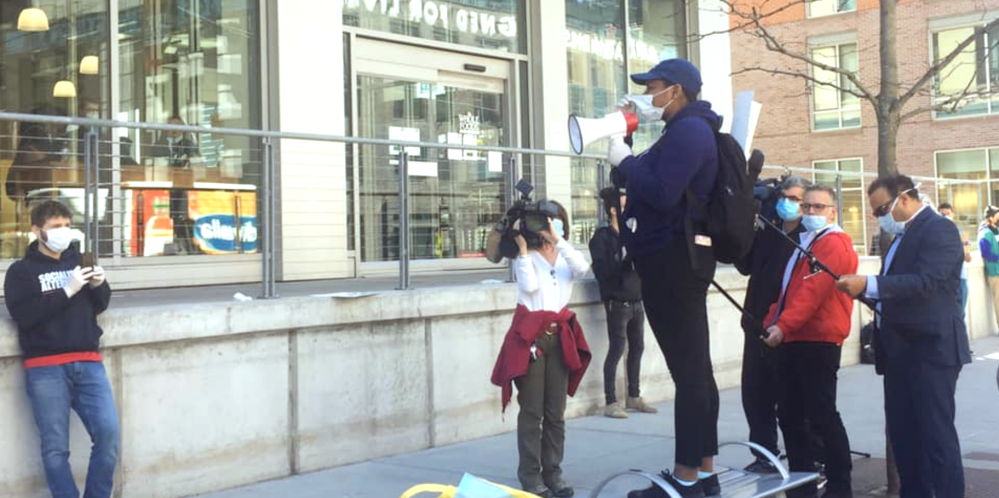“I’m constantly having the recommended six feet violated. All of my coworkers and I, we are absolutely drained by the end of the day, because we are constantly trying to protect ourselves and reinforce that space.”
Over the course of the coronavirus pandemic, grocery stores have become key sites of activity, stress, and anxiety. Lines form outside of supermarkets, as customers hope to stock up on essential items, while inside, the people who work there are putting their lives at risk every day. Shelves in some stores have gone bare, a sign of the urgency of the crisis and the need that customers are experiencing. While the work of grocery store workers is indispensable, as people on the frontlines of the outbreak, their rights have not been fully met.
Jonathan (an alias used to protect his anonymity), a worker at a Boston Whole Foods, said that when the virus first broke out, there were limited protections for employees. He initially faced a tremendous amount of apprehension when going to work, aware that he was caught at the center of the crisis.
“At the outset of this, there was not a lot of preparation, and safety measures were rolled out really slowly,” Jonathan said. “I was there on the sales floor, and customers weren’t aware of social distancing. … The way that situation pans out is that if you’re a team member on the sales floor, you’re interacting with hundreds of people per day, and you are going to be closer than six feet. It’s not part of customer service culture that you’re going to tell people to back up. … Among team members, it didn’t seem like it was taken seriously at the beginning.”
Since then, Whole Foods has adopted some safety measures, including distributing gloves and masks at the beginning of each shift and offering “unlimited call-outs” to employees unable to work during the pandemic. On April 7, Massachusetts Governor Charlie Baker issued new guidance for grocery stores that limits the amount of people allowed inside to 40 percent of the building’s legal occupancy. On their end, the Whole Foods chain has agreed to pay workers an additional two dollars an hour as compensation for putting their health on the line. According to many, that’s not nearly enough.
“The reality is that two dollars is not fair hazard pay,” Jonathan said. “That comes to an extra fifty bucks a week, and even for fifteen dollars an hour, for someone who lives and works in Boston, that’s really not that much. … We’re putting our lives on the line by coming in to work, but the hazard pay that they’ve given us does not make up for that.”
Employees at Trader Joe’s have also expressed that they experienced a lack of regard for their wellbeing at their place of work. As the Daily Beast reported on Thursday, an employee [in Westchester, New York] is dead, and despite the company’s reputation as a bright spot in an often cruel economy, workers fear he or she won’t be the last.”
Zachary (also an alias), who works full-time for Trader Joe’s, said that until recently, workers were forbidden to wear masks and discouraged from wearing gloves, with management saying they did not want to alarm customers. This situation changed after two staff members were diagnosed with the virus.
“Not only were there really no protections being put up initially, but we were being told specifically not to have personal protective equipment,” Zachary said. “Customers, still now, do not show any self awareness. I’m constantly having the recommended six feet violated. All of my coworkers and I, we are absolutely drained by the end of the day, because we are constantly trying to protect ourselves and reinforce that space.”
Dennis (also an alias), a former Trader Joe’s employee, noted that the business took a strong anti-union stance, which he found disturbing. He said that at the particular location where he worked, a pattern of hiring and firing employees regularly took place, a practice that would not have occurred if there was a union contract in place. A March 31 letter from Trader Joe’s CEO Dan Bane to all crew members reflects the company’s position on organized labor. It reads, in part:
I want to share my thoughts related to the current barrage of union activity that has been directed at Trader Joe’s and other “non-union” grocers during this difficult time. A host of union campaigns have been launched that seek to capitalize on the current unstable environment in America – one in which misinformation and fear are spreading unchecked in the media and we are unable, due to travel restrictions, to spend time in stores around the country talking directly with our Crew Members as we normally do. Overall, it does not matter to these union advocates if their “allegations” are true or not. They clearly believe now is a moment when they can create some sort of wedge in our company through which they can drive discontent, by claiming only joining their union will protect the pay and benefits you currently enjoy.
Bane goes on to explain that “the National Labor Relations Board (NLRB) has deferred all potential union elections during this pandemic period,” and to call the claims of organizers “a distraction.”
On the Whole Foods front, Jonathan is part of a coalition, affiliated with the organization Socialist Alternative, of workers from 12 grocery stores who are fighting for the rights of supermarket employees. The group organized a protest on Tuesday near a South End Whole Foods, bringing together workers from Stop & Shop, Whole Foods, Trader Joe’s, and Shaw’s. Wearing facemasks and holding signs, the protesters asked for stronger protective measures, paid sick leave, and fair hazard pay. Margaret Whittier-Ferguson, a member of Socialist Alternative and an organizer behind the rally, said that the demonstration was successful in that it called attention to the rights she’s working to advance.
“Our goal is to stand with the workers who are inside that store, who might be feeling afraid for their jobs right now,” Whittier-Ferguson said. “Hopefully those workers can see that they aren’t alone in this. Hopefully they can see that there’s a group of workers across stores, not just at one store, who are actively fighting for better working conditions.”
The coalition and members of Socialist Alternative have also taken on the project of drafting a petition that calls, on behalf of grocery store workers, for three demands: 1 – supermarkets should take protective measures, such as providing workers with face masks and gloves, offering sanitizer to employees and customers, and limiting the number of people allowed in the store; 2 – workers should get paid sick leave and paid family leave, so that they can care for their children or families, if necessary; 3 – there should be hazard pay of time-and-a-half wages for every hour of all shifts. Whittier-Ferguson said that she hopes workers will take inspiration from the petition, and that actions like this one will spread.
Lisa Wilson, a cashier at Shaw’s in Hyde Park, said that she hopes to see changes in the way grocery workers are treated, as the situation right now can only be described as “gloomy.” For Wilson, the fear of not being able to pay bills and provide for her family is stronger than the fear of getting sick at work, she said. But the atmosphere at Shaw’s continues to be heavy with anxiety.
“Whenever I’m in the break room, the main conversation that seems to be not, ‘If I get the coronavirus,’ [but] ‘This is what I’m going to do when I get it,’” Wilson said. “I’ve heard this mother—she’s one of the regular employees and has three kids. She says, ‘When I get the coronavirus, I don’t know where I’m going to live, because I refuse to take it home to my husband and my kids.’”
While people have expressed their gratitude for the service of grocery store workers, Jonathan said that he does not see his work as valiant. Rather, he is simply doing his job and what he needs to get by.
“There’s this real dissonance—I’m here because it’s my job,” Jonathan said. “You see in the media, they’re calling us heroes, and customers are saying, ‘Thank you for being here.’ We’re here, not because of some kind of call to duty. We’re here because we have to pay our rent and get our health insurance, because if we just stop showing up, we’d be broke.
“When you’re there, it’s really anxiety inducing, because you interact with so many people, you know you’re going to get sick.”








